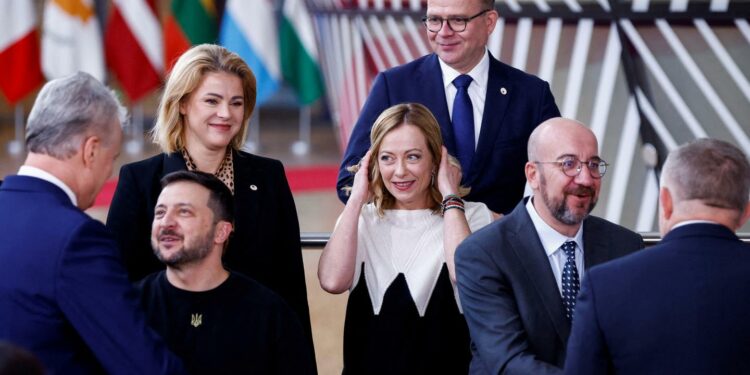A photo of European Union (EU) leaders, widely circulated on social media, says a lot about the current priorities of the EU and the balance of power within it. Giorgia Meloni, the Italian prime minister, is seated with 10 of her counterparts, including Dick Schoof of the Netherlands, Mette Frederiksen of Denmark, Kyriakos Mitsotakis of Greece, Karl Nehammer of Austria, Donald Tusk of Poland, Viktor Orban of Hungary and Commission President Ursula von der Leyen.
Ahead of the meeting of European heads of state and government in Brussels on Thursday, October 17, they met to discuss these “innovative solutions” to immigration, so much in vogue in Europe in recent weeks, and spearheaded by Italy, which has outsourced the processing of asylum applications to Albania.
There’s a “different atmosphere” than in the past on migration issues in Europe, welcomed Dick Schoof. “There has never been such a consensus on this subject, and this consensus has drifted to the right of the political spectrum,” noted a senior European civil servant, at a time when the right and the far right are gaining ground throughout Europe.
Calls for new partnerships
More and more member states are calling for a tightening of EU policy in this area, despite a 42% drop in irregular entries into the EU since the start of the year. Even Germany, a usually welcoming country, has reinstated border controls and tightened entry conditions. “It’s about tightening European rules while remaining true to our values,” said French President Emmanuel Macron.
Read more Subscribers only Immigration takes center stage once again at the European Council’s autumn meeting
Six months after the adoption of the Pact on Migration and Asylum, which aims to harmonize procedures for receiving and processing applications from migrants at the Union’s borders, the Europeans are back to the drawing board. Madrid, Berlin and Paris, among others, are calling for the text to be put in force before the June 30, 2026, deadline.
The 27 member states are also calling for new partnership agreements like those with Tunisia, Egypt and Mauritania. In return for development aid, these countries would commit to better control departures. Von der Leyen has already announced that she will be holding talks with Senegal and Mali.
Europeans also expect Von der Leyen to submit, as she announced this week, new legislation on the expulsion of rejected asylum seekers. With only 18% of asylum seekers actually leaving the EU, the bloc is expected to significantly tighten current rules, in force since 2008. The European Parliament, where the right and far right gained seats in the June 10 European elections, is likely to follow suit.
You have 60% of this article left to read. The rest is for subscribers only.
Source link : http://www.bing.com/news/apiclick.aspx?ref=FexRss&aid=&tid=67122569d24d4813b46723e1529b8bfd&url=https%3A%2F%2Fwww.lemonde.fr%2Fen%2Finternational%2Farticle%2F2024%2F10%2F18%2Feuropean-union-wants-to-toughen-fight-against-illegal-immigration_6729757_4.html&c=2732940912413091075&mkt=de-de
Author :
Publish date : 2024-10-18 02:05:00
Copyright for syndicated content belongs to the linked Source.


